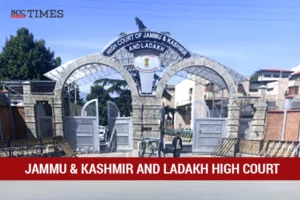Jammu and Kashmir and Ladakh High Court: While considering the instant petition wherein the Court had to consider whether maintenance proceedings under S. 488 of CrPC can be quashed on the ground of husband’s pleading that he had already divorced his wife; the Bench of Vinod Chatterji Koul, J.*, held that in order to enable a husband to escape the obligations under marriage contract including the one related to maintenance, the husband has to compulsorily plead and prove the ingredients of Talaq. Mere pronouncement of “talaq” three times or execution of divorce deed will not suffice. It was held that the Court in all such cases would give a hard look to the case projected by the husband and insist on strict proof.
It is only after the husband has pleaded and proved the ingredients that such talaq would be operative and the marriage between the parties would stand dissolved thereby qualifying the husband to escape his obligations under marriage contract.
Background and Contentions: The respondent had filed an application under S. 488 of CrPC for maintenance before the Judicial Magistrate in 2009 which was dismissed by the Magistrate in February 2018 stating that relationship between the parties as spouse did not exist.
Aggrieved with the afore-stated order, the respondent filed a revision petition. Consequently, the Revisional Court on 24-10-2018 set aside the Magistrate’s order of dismissal and directed the petitioner to pay maintenance of Rs 3000 per month to the respondent.
Aggrieved with the Revisional Court’s order, the petitioner filed the instant petition.
The petitioner contended that Revisional Court did not take note of the fact that the Magistrate passed the order after full trial and discussion of case projected by the parties and evidence adduced by them and after it was found that respondent has already been divorced. It was also stated that reconciliation efforts and reasonable cause for divorce was appropriately proved.
The Petitioner also placed a copy of Talaknama thereof revealing that petitioner to put an end to the wedlock, made three pronouncements of Talaq, thereby declaring that he has divorced the respondent and relieved her out of the wedlock. According to petitioner, the Talaknama was conveyed to the respondent.
Court’s Assessment: Persusing the issue and the legal trajectory of the case, the Court took relied on Mohammad Naseem Bhat v. Bilquees Akhter1, wherein a Bench of J&K and Ladakh High Court had lucidly dealt with the issues that have cropped up in the instant case.
The Court pointed out that Mohammad Naseem Bhat (supra) clearly stated that for making divorce (Talaq) valid, it is not enough that it is pronounced in presence of two witnesses. The witnesses must be endued with justice as the purpose is to ensure that the witnesses, prompted by their sense of justice, may request and persuade the spouses on the verge of separation, to calm down, resolve their disputes and lead a peaceful marital life.
The Court further stated that for a husband to escape the obligations of marriage contract including maintenance, he must compulsorily plead and prove the following-
-
Effort was made by the representatives of husband and wife to intervene
-
Settle disputes and disagreements between the parties and that such effort for reasons not attributable to the husband did not bear any fruit
-
He had a valid reason and genuine cause to pronounce divorce on his wife
-
Talaq was pronounced in presence of two witnesses endued with justice
-
Talaq was pronounced during the period of tuhr (between two menstrual cycles) without indulging in sexual intercourse with the divorcee during said tuhr.
“It is only after the husband pleads and proves all the above ingredients that divorce-Talaak, would operate and marriage between the parties would stand dissolved so as to enable husband to escape obligations under the marriage contract”.
The Court pointed out that in the instant case petitioner placed a copy of Talaqnama which reveals that petitioner puts an end to the wedlock by three pronouncements of “Talaq”. The Court also took notice of statements by 2 persons who had gone to the house of respondent intimating that the petitioner wanted to divorce her, but she did not accept the said proposal and the conversation was not successful. It was also found that efforts for reconciliation were not coming to any fruition and there had been no sufficient evidence to establish reconciliation from the side of petitioner.
The Court thus found that the Revisional Court had rightly considered the rival contentions of the parties and come up with impugned judgement, setting-aside the Magistrate’s order on February 2018 and directing petitioner to pay an amount of Rs.3000 per month to respondent as maintenance.
[X v. Y, 2024 SCC OnLine J&K 512, decided on 04-07-2024]
*Judgment delivered by Justice Vinod Chatterji Koul
1. (2012) 4 JKJ 318

